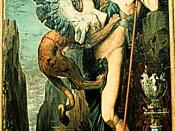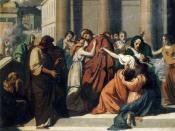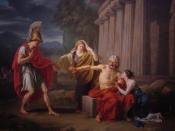In the play Oedipus Rex, Oedipus, commented by Aristotle, is considered to be the ideal example of a tragic hero. In his Poetics, Aristotle defines tragedy and determines its necessary components. He defines tragedy as an imitation of actions that provoke pity and fear, which in turn results in Catharsis, the cleansing of unwanted feelings. Thus, every component of a tragedy must revolve around the production of catharsis. Aristotle believes that Oedipus was the ideal tragic hero because of the strong bond with the audience and that he excited intensified pity and fear. Oedipus perfectly portrays the 4 main characteristics mandatory in a Greek drama, which were nobleness, harmartia, reversal (perpeitia) and the recognition.
Oedipus was a man of respect in many senses, which is an important and mandatory characteristic of the ideal tragic hero. Aristotle states that in a tragedy, the tragic hero must be "better than in real life" to create respect.
For pity and fear can not be excited by a virtuous man brought to adversity, a bad man rising to prosperity or a villain meeting his downfall. It can only be excited by the unsuspected downfall of a man of honour, whose punishment was greater than that of his crime, for pity is provoked by undeserved punishments and fear is provoked by its possibilities of the everyday man. Through royalty, Oedipus was of considerable nobility since birth. In reality, he was the son of Laius and Jocasta, the king and queen of Thebes, and falsely, the son of Polybus and Merope, king and queen of Corinth, both true and false, earns him his virtue. However, the nobility of royalty is common in some sense, compared to the respect Oedipus gained through the defeat of the Sphinx. The defeat of the Sphinx was seen...


